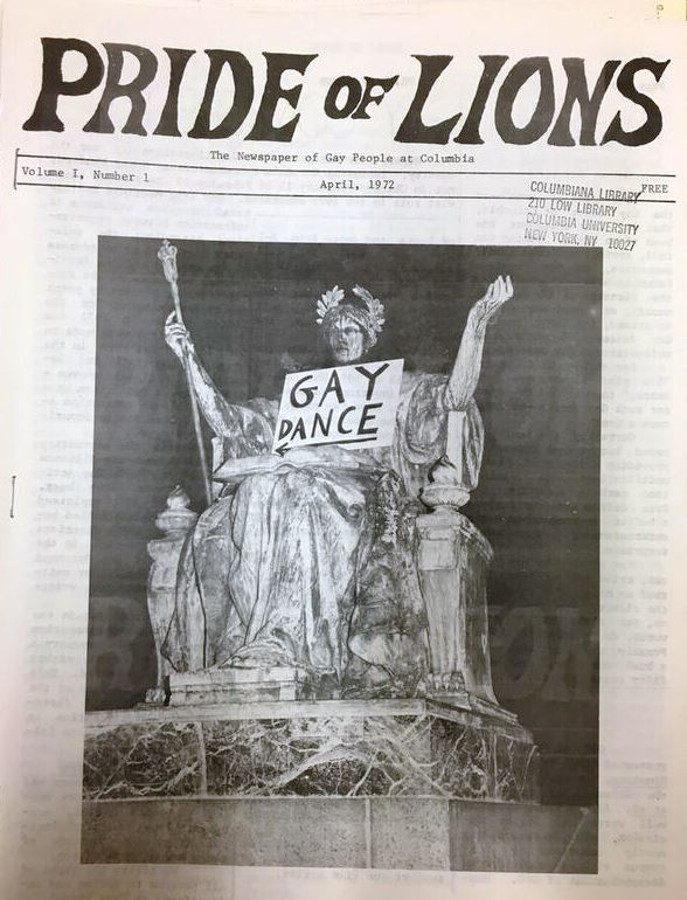
c/o Columia Alumni Association
Three years ago, I wrote my first ever Argus article. It explored my frustration with the lack of queer spaces at Wes, an institution I assumed would have a more established feeling of queer community as an incoming freshman. Looking back at that article, I have mixed feelings. On one hand, I see an opinionated freshman complaining about life at Wes with very little experience as a queer person on campus. I had unrealistic expectations for queer life at Wes and my frustration when those expectations were not realized is clear to see. At the same time, I think I made some valid arguments about the lack of queer community at Wes that now, as a senior, I have more authority to speak on.
I was inspired to revisit my initial article on queer spaces after attending Columbia University’s Annual Gay Dance over fall break. While I enjoyed myself at the dance, being there made me wish that Wesleyan had a similar party for queer students—an event for us to build community and celebrate our diverse identities as LGBTQIA+ people. Why isn’t there a gay dance at Wesleyan? Such an event would be incredibly affirming for queer students looking to build relationships with other queer students, especially those who are newer to campus. A gay dance, or something like it, would certainly have made my freshman self feel more validated in their identity and a little less alone.
Why is there so little intentional community building among queer students at Wes? Why are there so few queer student groups? My hunch is that it has to do with the prevailing feeling among students and the administration that Wesleyan is a gay school. Let’s face it: they’re right! As Becca Baron ‘23 once tweeted, “99% of all Wesleyan students are either gay or vegetarian” to which President Michael Roth ‘78 responded, “Or?” Wesleyan has the reputation of being a gay and accepting school, so there is less of a perceived need for queer students to band together and carve out their own spaces on campus. What this means in practice is that being a queer student at Wesleyan can often feel isolating.
One weakness of my first article is the way I tried to speak for people outside my experience. From my initial dissatisfaction, I made generalizations about queer life at Wesleyan based on my individual perspective, and in doing so failed to realize I could only speak for myself and my time at the University.
For me, at least, being queer at Wesleyan has been a very lonely experience. Of course, there have been complicating factors. A few months after my article was published, the pandemic hit, forever changing the ways in which we interact with one another in public. It would be hard to find one person who hasn’t felt despondent and isolated due to the shared trauma of the pandemic.
At the same time, even when things opened back up on campus, I still felt alone. Although I’ve formed relationships with other queer people at Wes that I cherish today, I would be remiss to say that I’ve ever felt a concrete sense of queer community on campus. Over the past three years, I’ve spoken to students who have echoed this sentiment. I think it’s especially hard for us as college students to prioritize building community with one another when we’re all busy doing our own thing. It makes sense to me that there isn’t a cohesive queer community at Wesleyan, but that doesn’t mean we can’t strive for one. Groups on campus like SPECTRUM and organizations like The Resource Center do important work creating spaces for queer students on campus, but there is still so much work to be done.
There needs to be a concerted effort on behalf of the administration to improve queer life at Wesleyan. This could take several forms, such as the University providing funding for more queer student groups and events, like a queer dance. I also think it would be helpful if there was a committee, perhaps run through the Resource Center, that helped plan queer events on campus and had input from students on the kinds of gatherings they would be most excited to attend. While these are only first steps in establishing a more concrete queer community at Wesleyan, they are vital in helping queer students feel a deeper sense of belonging on campus. With greater action from the University, I’m hopeful that Wesleyan will be a warmer and more inviting place for queer Cardinals in the future.
Ben Togut can be reached at btogut@wesleyan.edu
-
LemmyC